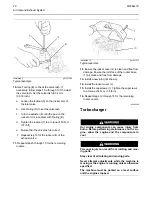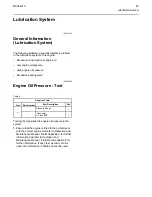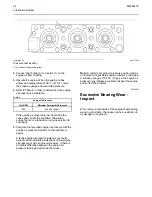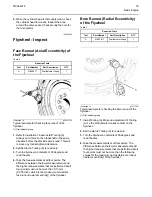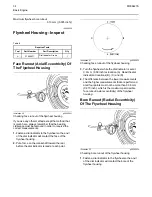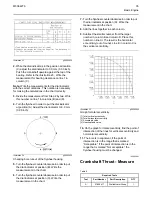
Cooling System
i02857803
General Information (Cooling
System)
This engine has a type of cooling system that is
pressurized. The cooling system has two
advantages.
• The pressure helps prevent cavitation.
• The risk of boiling is reduced.
The boiling point is affected by three factors:
pressure, altitude and concentration of glycol in the
coolant. The boiling point of a liquid is increased by
pressure. The boiling point of a liquid is decreased by
a higher altitude. Illustration 13 shows the effects of
pressure and altitude on the boiling point of water.
Illustration 13
g00286266
The boiling point of the coolant also depends on the
type of coolant and the concentration of glycol. A
greater concentration of glycol has a higher boiling
temperature. However, glycol transfers heat less
effectively than water. Because of the boiling point
and the efficiency of heat transfer, the concentration
of glycol is important.
Three basic problems can be associated with the
cooling system:
• Overheating
• Coolant loss
• Overcooling
If the cooling system is not properly maintained,
solids such as scale and deposits reduce the ability
of the cooling system to transfer heat. The engine
operating temperature will increase.
When the engine is overloaded, the engine will run in
the lug condition. When the engine is running in the
lug condition, the engine is operating at a lower
engine rpm that reduces the coolant flow. Decreased
coolant flow during high load will cause overheating.
Coolant can be lost by leaks. Overheated coolant can
be lost through the cooling system's pressure relief
valve. Lower coolant levels contribute to additional
overheating. Overheating can result in conditions
such as cracking of the cylinder head and piston
seizure.
A cracked cylinder head or cylinder liner will force
exhaust gas into the cooling system. The additional
pressure causes coolant loss, cavitation of the water
pump, less circulation of coolant, and further
overheating.
Overcooling is the result of coolant that bypasses the
water temperature regulators and flows directly to the
radiator or to the heat exchanger. Low load operation
in low ambient temperatures can cause overcooling.
Overcooling is caused by water temperature
regulators that remain open. Overcooling reduces the
efficiency of operation. Overcooling enables more
rapid contamination of the engine oil. This results in
the formation of sludge in the crankcase and carbon
deposits on the valves.
Cycles of rapid heating and cooling can result in
cracked cylinder heads, gasket failure, accelerated
wear, and excessive fuel consumption.
If a problem with the cooling system is suspected,
perform a visual inspection before you perform any
tests on the system.
Pressure Test on the Oil Cooler
Table 5
Required Tools
Tool
Part Number
Part Description
Qty
A
-
Pressure Gauge
1
28
M0064276







